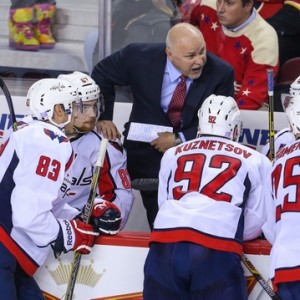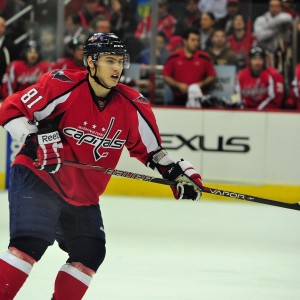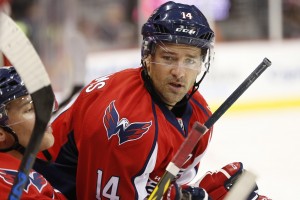After one period at the Verizon Center Tuesday night, the Washington Capitals trailed the San Jose Sharks, 1-0. It could have been worse. It should have been worse. In fact, the Sharks took it to the Cap so badly that it looked like it could be one of those games in which one team weathers the storm early and then comes back with strong second and third periods to steal the victory. Alas, ‘twas not to be.
Minus superstars Alexander Ovechkin, sitting out for what was originally called “personal reasons” before the truth surfaced Wednesday that he had been benched for oversleeping and arriving late to the morning skate, and Nicklas Backstrom, the Capitals actually looked worse during the opening minutes of the second period, falling behind 3-0 and then never recovering in a 5-0 loss that featured a mystifying disallowed goal for Washington and two empty-net goals for the Sharks.
San Jose played with more energy from the opening puck drop in all zones of the ice, using a suffocating forecheck and an aggressive neutral-zone presence to force the Caps into turnovers and mistakes that led to huge advantages in shots and puck possession. The Sharks outshot Washington, 17-8, after one period and extended that margin to 23-8 in taking that 3-0 lead in the opening 7-1/2 minutes of the second period.
From San Jose eased it into cruise control and allowed the Caps to make the effort look deceivingly even statistically before Barry Trotz pulled Braden Holtby for the majority of the final five minutes, leading to the empty-net tallies.
By the final whistle Washington had closed the shots-on-goal margin to 32-31, but the contest was never that close. And the Caps could not figure out Martin Jones, who stopped all 31 of those offerings in recording his second consecutive shutout. Jones has now stopped the last 77 shots fired his way.
Five different players scored for San Jose, including Mike Brown, who hadn’t tallied since 2013. John Carlson played 25 minutes and recorded a minus-1 on the night to earn the game’s third star, but neither he nor any of the other defensemen had a particularly good night, getting outmuscled on the outside, losing track of forwards in front of the net and getting caught up ice without hustling back.
Jason Chimera for the second straight game was Washington’s best player, using his speed and strength to create scoring chances and get under the Sharks’ skin. He finished with a team-high six shots on goal in just under 14 minutes of ice time. Braden Holtby was decent, but not spectacular, stopping 27 of 30 shots.
The Fans-Eye View
From a fan’s perspective, this game was a dud from the start. No Backstrom and Ovechkin, a late-arriving and subdued Tuesday-evening crowd and a lackluster effort from the team.
The Fans’ Report Card
Final Result: F
A blowout loss in which the home team was outskated right from the start.
Atmosphere: D
Mid-week crowds early in the season in D.C. are often late-arriving and not very vocal. This was the case Tuesday, and the team’s effort didn’t hurt. The consistent “Ref you suck” chants were the only times the fans got into the game.
Pace of the Game: C
The Caps’ pace was an F, but San Jose’s speed and energy made up for it a little.
Home Team Effort and Energy: D
It would have been an F if not for a decent final 10 minutes of the second period and guys like Chimera, T.J. Oshie and Justin Williams.
Offense: F
A shutout, need I say more?
Action: D
Again, when one team plays balls to the wall and the other doesn’t, the overall action evens out. The Caps did outhit the Sharks by a wide margin and there was some good referee drama and some bench hijinks featuring Chimera and Joe Thornton. No fights either.
Overall Fan Grade: D-
This was a tough one for me to swallow, driving an hour from Baltimore, paying extra to park close to accommodate my son’s broken foot and dropping $31 on bad concessions.
Coach’s Corner

Usually I go easier on the players than Barry Trotz goes, so you can only imagine what he thought of this effort:
“They were putting pucks to the net and playing faster than we were {in the first period},” Trotz said, “and you’re on your heels. The whole mindset that you have against the San Jose Sharks is that they’re a quick-start team and they funnel everything back to the net and into play. They did a great job of it. They got pucks deep. We wanted to make plays and be slow and they don’t allow you to.”
The Sharks were all over Washington on the forecheck right from the start. The Caps also struggled to get the puck out of their defensive zone and were unable to match San Jose’s forecheck with any noticeable energy of their own. San Jose had great success going hard to the outside against the Washington defensemen, with Brent Burns, ex-Cap Joel Ward and big Joe Thornton taking advantage of size and strength advantages to create scoring opportunities. The Sharks’ second goal came after Chris Tierney drove hard around Justin Williams, who was covering for Dmitry Orlov, to get a puck to the net and generate a rebound that Brown was able to shove past Holtby.
The Sharks enjoyed a 6-0 shots advantage to open the second stanza and increased their lead to 3-0 at 7:25 when Tommy Wingels capitalized on a miscommunication between Holtby and Matt Niskanen to set up Thomas Hertl, who had gotten behind Karl Alzner in the slot, for another point-blank marker. That play forced Trotz to use his timeout.
“The second half we were better,” Trotz said. We weren’t great, but we were better. We’re starting to understand that we have to get our identity. If there’s a play to be made, make the play. But if there’s not a play, we better get that puck behind and go get it and hang onto it and be heavy on people. I thought in the first part they played quicker, and we weren’t very heavy. We were very light and we lost a lot of battles.”
The Caps did pick up their play after the timeout and appeared to get themselves back in it at 10:21 of the second when Orlov’s bar-down rocket beat Jones high to the stick side. Tim Peel originally ruled the play to be a good goal, but changed his tune after a coach’s challenge – ridiculous call that has already been ripped throughout the hockey world and will not be discussed further here. That goal might have turned the tide, but there really is no evidence that Washington would have been able to put it together enough to make things interesting.
“I thought we got one there, but they won the coach’s challenge,” Trotz said. “We did some things, but it wasn’t near enough. It’s not the level of expectations and play that I have for this group. I told them that, and I think they saw it. Sometimes it’s good to get a wakeup call, and we need a wakeup call. I didn’t like our first game, and obviously I didn’t like the first part of this one. The only ones who can fix it are us in the room. We’ve got good people and good leadership, and we’ll get it fixed.”
Or-Lost?

Defenseman Dmitry Orlov, who missed almost a year and a half recovering from a wrist injury, has played alongside Nate Schmidt on the Caps’ third defensive pairing thus far and has struggled a bit. He has forced passes, causing turnovers, in both the offensive and defensive zones – sometimes making decisions that you wouldn’t expect to see from peewee-level players.
That is to be expected after the long layoff, and there’s nothing wrong with a little rust. Orlov is an exceptional skater, with good skill and a booming shot – as we saw on the disallowed goal. What is not acceptable is a tendency that I have seen for him to get frustrated or sulk on the ice and give up on plays. Such was the case on the Sharks’ second goal.
Orlov tried to pinch to keep the puck in the offensive zone, but it ricocheted off his pads and was pushed up the ice to Tierney. Justin Williams, as he was supposed to, covered back for Orlov, but Tierney realized that and drove hard wide around the forward. Schmidt was skating with Brown and made a half-hearted move to cut off Tierney, leaving Brown alone in the slot. Orlov, figuring that his teammates would shut down the 2-on-2, loafed back, gliding across the blue line as Brown buried the juicy rebound off of Holtby’s pads. Had Orlov skated hard the whole way Brown would not have gotten a shot off.
What We Have Here is a Failure to Communicate
On the Sharks’ third goal, Holtby and Niskanen got their wires crossed and then Alzner lost his man, Hertl, in front of the net in a dangerous position.
San Jose dumped the puck weakly in toward Holtby, who left the crease and gathered the puck on his stick to the left of the goal. Alzner pointed to the corner to Holby’s left and skated in that direction, calling for the puck. Niskanen, who was skating back to get the puck, saw Alzner and peeled off to the opposite side of the net, assuming that Holtby was going to pass to his partner.
Instead, Holtby left the puck where Niskanen was originally heading, and it was picked up by Wingels. Wingels started a cycle out of the corner to Holtby’s left that ended up with him feeding Hertl, who had gotten behind Alzner, for the point-blank score.
Coach Barry Trotz’ Grade for the Team: D
His postgame comments made it pretty clear where he stood on the effort.
The Players’ Perspective
To a man the Caps’ players did not hide from the fact that they threw out a stinker Tuesday night:
Alex Ovechkin – Pressbox Player View
“We played a bad game. I hope {the next game} is going to be a different game for us.”
Matt Niskanen – On Missing Ovechkin and the Game
“He’s a tremendous player, and it hurts not having that threat in the lineup. But that shouldn’t keep us from going out and competing really hard and being mentally ready to play.”
Braden Holtby
“We played the same first period that we played the first game against a very-skilled team that’s playing very good hockey and we got exposed the whole first half of the game. Myself and the team, we were a step behind, slow, not communicating well. We’re not playing very good hockey. The last half of the game they’re sitting back on their heels waiting, so it’s hard to judge the game that way. It’s just not even close to good enough.”
T.J. Oshie
“We need to keep it simple early. There are a lot of guys in here who can make a lot of good plays, but until you back a team off and wear them down a little bit I think those plays don’t work really. It all started tonight with my line. We started the game and got off to a tough start and didn’t really get any momentum going after that for a while.”
Players’ Grade for Themselves: F
There really weren’t any positive postgame comments that I heard.
Statistically Speaking

Just from the eye test and from reading Trotz’ comments it was pretty evident that the Caps were on the low end of the energy spectrum Tuesday. They seemed a step slow most of the night, whether it was on the forecheck or defensively, and although they recorded more hits than the Sharks, there was no doubt that San Jose was more aggressive and won more one-on-one battles.
It’s early in the season, but one thing that the dump-in statistics we are tracking in this space seems to gauge is a team’s energy, aggressiveness and relative success or failure on the forecheck:
- In the first period alone the Caps dumped the puck a total of 12 times, regaining possession only once (8.3% recovery). On the flipside, the Sharks went 6-for-8 (75%) recovering dump-ins. From those dumps San Jose recorded shots on three possessions (37.5 %), translating into six total shots on goal, two scoring chances and one goal.
- Predictably the dump-in stats evened out somewhat as the game progressed since San Jose basically called off the dogs after taking the three-goal advantage. The Caps did adapt to their lack of forechecking success, dumping the puck only 12 more times over the final two stanzas, but as we will discuss below, that may have been their ultimate downfall. For the game Washington dumped the puck 24 times, coming away with possession on five occasions (16% overall, but 41.7% over the final two periods). By the way, the Caps ended up outshooting San Jose 23-14 during the final 60 minutes.
You can’t say that the Caps didn’t adjust to their lack of forechecking and breakout success after the first period. That was evident in one of the other stats we are tracking, grey-zone turnovers, meaning that Washington altered it’s zone entry and exit strategies given the headaches that the Sharks were causing them on both ends of the ice. Remember that the grey zones are the areas within 10 feet on either side of both blue lines, critical areas of the ice to determining breakout and zone entry success.
- In the first 3:21 of the second period the Caps committed eight total grey-zone turnovers, leading to six San Jose shots, four scoring chances and one goal.
- Five of those turnovers came at the defensive blue line in just the first 2:23, with the sixth ultimately resulting in the Sharks’ second goal.
- After the goal, Washington pressed offensively, with players possibly trying to do too much on their own to make plays, resulting in two offensive grey-zone turnovers, one of which culminated with a semi-breakaway and a 1-on-1 chance for the dangerous Logan Couture.
- At this point the shots on goal were 23-8 in San Jose’s favor, and Washington was swimming upstream to get back in the game. That momentum and more Sharks’ pressure led to the third goal 7-1/2 minutes into the second period.
- The grey-zone numbers for the game for Washington: 30 total turnovers (14 offensive, 16 defensive), leading to eight shots on goal, seven scoring chances and one goal allowed. San Jose recorded shots on goal after eight of those takeaways (26.7%) and scoring chances five times (16.7%). The Sharks tallied 25% of their total shots on goal following grey-zone miscues.
- For San Jose: 24 grey-zone turnovers overall (but 19 over the last two periods), leading to eight shots on goal (25% of total shots) and two scoring chances. The Caps generated just one shot off of 13 Shark offensive grey-zone turnovers, but seven on 11 defensive grey-zone miscues.
- San Jose allowed just one shot on goal and no scoring chances after offensive grey-zone turnovers, compared to Washington’s three shots, three scoring chances and two odd-man rushes allowed – a strong indicator that San Jose was moving its feet more effectively and backchecking with more urgency than the Caps.
- In the tone-setting first period the Sharks committed just five total grey-zone miscues, compared to nine for Washington. During the final two periods that gap closed, with San Jose totaling 19 to the Caps’ 21.